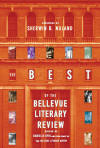The Best of the Bellevue Literary Review
No human thing is more universal than illness, in all its permutations, and no literary publication holds more credibility on the subject than The Bellevue Literary Review. I say this with upmost confidence as an English professor, a registered nurse, and as someone who recognizes the historical and philosophical origins (and namesake) of this fine literary periodical: Bellevue Hospital Center.
No human thing is more universal than illness, in all its permutations, and no literary publication holds more credibility on the subject than The Bellevue Literary Review. I say this with upmost confidence as an English professor, a registered nurse, and as someone who recognizes the historical and philosophical origins (and namesake) of this fine literary periodical: Bellevue Hospital Center.
Most know Bellevue Hospital for its history (the nation’s oldest public hospital), for its prestige (Nobel Laureates in medicine, the development of the polio vaccine, etc.), or for its fame (celebrity and literary patients; a locale of several films – the hospital continues to enliven the national imagination). Yet, the grounds of Bellevue offer even more, nestled in an office on the sixth floor: The Bellevue Literary Press, a publisher of highly regarded books, a prestigious literary magazine, and now a compilation of the magazine’s finest work, Best of the Bellevue Literary Review.
This is an anthology of immediacy. Doctors, nurses, technologists, students, patients, family members – they know too well the blue clutch of illness, healing, and failure of healing. These are their pages, their words, of evocative honesty, of powerful voice, and whispered suffering. Of sometimes wonderful, sometimes terrible, but always urgent and necessary, truth.
Jan Bottiglieri shows in her flash fiction “Having an MRI/Waiting for Laundry,” how illness affects memory, transforming the ordinary moments of life into sweet, treasured nostalgia: “Because the noise here inside the MRI machine is so common, so familiar, that within seconds I am leaning against the wall near the back door of my mother’s house, circa 1975, listening to the green Maytag spin.” As she lies supine and still inside the MRI’s cold metal tube, the patient’s memories (“An aching love for even the smallest detail”) spin, the images focus, “as clear as the sunlight through the open door.”
In his poem, “Revelations,” David Shine writes of another patient:
Before he died,
the man with the new
artificial heart
sat mantis-thin,
in his striped hospital robe
and spoke in a whisper
The hardest part, he said
is not having a heartbeat,
just a whir.
But no one asked about
being afraid, how it felt
without the pounding.
If his joy was tempered
by the resolve of the device,
never racing or skipping a beat.
Or whether in sadness
an ache gripped his chest
like pain in a phantom limb.
What an odd and beautiful poem. The idea of change – of the winding path of illness, with all its thickets – is physical, but also inevitably of the soul. The heart is never only an organ. Illness is never exclusively an experience of flesh. And patients need to voice their stories, to be asked to give testament in words of revelation. This narrator’s illness isn’t like yours or mine; his heart isn’t (literally), but, still, we all share trepidation, and suffering.
A physician’s perspective may differ from a patient’s, but the strange power of illness persists: often in the form of uncertainty, a reality of medicine we rarely glimpse in the role of patient. As Dr. Sherwin B. Nuland (an esteemed surgeon, teacher, and author) notes in his opening to the collection, “There are lots of things we can’t solve . . . sometimes you have to hold the patient’s hand and cry with them.”
In the section titled “Doctors,” we get poems of a surgeon’s “trembling fingers” (“She Makes the First Cut” by Linda Tomol Pennisi); of a physician watching helplessly as a patient, “boils in his skin in the valley of thirst / He is a burning man. He is sick. Low sick. He suffers” (“Prisoner” by John Stone); of the oft indifference of our fragile existence: “You know enough that for every miracle / on this earth, there’s at least three / that are grinding their marvels in reverse (“First Born” by John Grey).
Obviously, the strength of this collection is its quantity of voices and viewpoints on illness (the chapters are segmented in wide-ranging headings such as “Coping,” “Family,” “Madness,” “Death,” and so on), but I emphasize the most significant finding of this reviewer: the consistent quality. To put it simply, for literature to elicit understanding and empathy (clearly one goal of this publication), it must be written well. The excerpts listed here provide only a sampling, and the remaining pages glow with vivid imagery, energetic prose, a writer’s eye for verisimilitude and exactness of phrasing. During my years in healthcare, we had a term for such a powerful and essential thing: “Good Medicine.” Strong and stirring, often painfully honest – but always efficacious.





